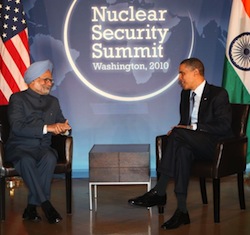Nuclear Security Should Matter to All Americans
Featured Image
We are happy to serve you a daily summary of the day's top nuclear policy stories each morning, with excerpts from the stories in bullet form.
Stories we're following today:
Remarks on Nuclear Nonproliferation at the University of Louisville as Part of the McConnell Center's Spring Lecture Series - Secretary of State Hillary Clinton [link]
- Today, I want to speak about a challenge that is bigger than any one Administration or any political party – it’s protecting our families, our neighbors, our nation, and our allies from nuclear terrorism and nuclear proliferation.
- There is a reason that presidents and foreign policy leaders in both parties are determined to address this danger. While the United States and old Soviet Union are no longer locked in a nuclear standoff, nuclear proliferation is a leading source of insecurity in our world today.
- Nuclear terrorism presents a different challenge, but the consequences would still be devastating. A 10-kiloton nuclear bomb detonated in Times Square in New York City could kill a million people. Many more would suffer from the hemorrhaging and weakness that comes from radiation sickness. And beyond the human cost, a nuclear terrorist attack would also touch off a tsunami of social and economic consequences across our country.
- That’s why nuclear security does matter to us all, and why we’re determined to meet this challenge.
- Protecting the United States of America from nuclear attack is an issue that should be important to every single American. It’s been an issue where our two political parties have always found common ground – with good reason. And advancing these efforts is critical to 21st century national security.
- Watch Secretary Clinton's speech here.
The Nuclear Security Summit - The New York Times [link]
- On Monday, President Obama holds a summit meeting in Washington to address these dangers. His very ambitious target is to secure all weapons-useable nuclear material within four years.
- Feel-good communiqués will not be enough. The meeting needs to produce concrete deadlines, working groups and future meetings to measure progress.
- After 9/11, the United Nations Security Council ordered all states to lock up vulnerable material, but left countries to come up with their own plans. There are no mechanisms to verify their actions or punish scofflaws.
- [The summit should produce an] agreement that there is more than enough weapons-usable material in the world — and a commitment to finally negotiate an international ban on its production.
- Mr. Obama should use the meeting to press key holdouts — Pakistan is the main problem, but China and India are not enthusiastic — to change their minds.
How to Build on the START Treaty - George Shultz and William Perry in the New York Times [link]
- This has been a remarkable time for the Obama administration. After a year of intense internal debate, it issued a new nuclear strategy. And after a year of intense negotiations with the Russians, President Obama signed the New Start treaty with President Dmitri Medvedev in Prague.
- Perhaps the treaty’s greatest accomplishment is that the negotiations leading up to its signing re-engaged Americans and Russians in a serious discussion of how to reduce nuclear dangers.
- We look forward to a follow-on treaty that builds on the success of the previous Start treaties and leads to significantly greater arms reductions — including reductions in tactical nuclear weapons and reductions that require weapons be dismantled and not simply put in reserve.
- Future arms reductions with Russia are eminently possible. But they are unlikely to be achieved unless the United States is willing to address points of Russian concern. Given all that is at stake, we believe comprehensive discussions are a necessity as we work our way toward ever more significant nuclear disarmament.
Obama Leads Summit Effort to Secure Nuclear Materials - The Washington Post [link]
- Obama has identified nuclear terrorism as "the most immediate and extreme threat to global security." His aides note that al-Qaeda has sought unsuccessfully to acquire an atomic bomb.
- The Fissile Materials Working Group, an umbrella organization for nongovernmental groups working on nuclear issues, estimated that there is enough "weapons-usable nuclear material" in the world to build more than 120,000 nuclear bombs.
- "There's a lot that has been done. There's a lot more to do. And the key will be to convince policymakers and nuclear managers around the world that this is a threat," said Matthew Bunn, a professor at Harvard's John F. Kennedy School of Government
- Note: Many members of the Fissile Materials Working Group are Ploughshares Fund grantees.
Missile Envy - David Hoffman in the Washington Post [link]
- Today, that arms race has ended, and the number of nuclear weapons in the world has fallen from more than 60,000 at the peak to about 23,000 today.
- Yet we have not shed the mind-set of overkill. Even with the signing of the new strategic arms accord last week, we are still left with excess -- thousands and thousands of nuclear weapons that do not make us any safer.
- In an age when our countries are not adversaries, we cling to an old concept because the other side does as well. The nuclear posture review stated that the United States and Russia "still retain many more nuclear weapons than they need for deterrence."
- This week, as world leaders gather in Washington for a summit on nuclear security, they must realize that today's threats are far more diffuse than in the past, and far less likely to be deterred by nuclear weapons. Without the burdens of the Cold War to hold us back, we are terribly tardy in cleaning up its legacy of nuclear overkill.
For a Comprehensive View of This Unique Nuclear Moment
See this video on today's nuclear dangers and the opportunity to address them by Joe Cirincione, President of Ploughshares Fund.



